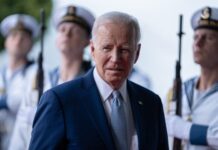
In a recent revelation, former President Donald Trump has voiced concerns over what he perceives as a potential threat to national security, suggesting that China might be orchestrating an infiltration strategy by sending military-aged men across the U.S. border. Trump's assertion taps into a broader discourse on immigration and national security, highlighting the intersection of geopolitical tensions and domestic policy.
Trump's warning comes against the backdrop of reports indicating a significant influx of Chinese migrants at the southern border, with figures surpassing 46,000 in recent years. This demographic shift, characterized predominantly by young, healthy males, raises questions about the intentions behind this migration pattern and its implications for U.S. security.
There has been an explosion of military-aged male Chinese nationals coming across the southern border.
This is deeply concerning.
Yet CNN, ABC, and NBC don't care.
Get the full story on Verdict 👇https://t.co/7Vl0KKVEnV pic.twitter.com/Qksf0eByVi
— Ted Cruz (@tedcruz) April 4, 2024
The former president has linked these developments to China's broader military ambitions, noting the Asian giant's projected naval expansion. With estimates suggesting China's fleet could grow to 425 ships, Trump contrasts this with a downsizing trend within the U.S. Navy. Such comparisons underscore concerns about shifting global power dynamics and the readiness of the U.S. to counter emerging threats.
During his tenure, Trump emphasized efforts to bolster the U.S. naval fleet, plans which he claims were derailed by the Biden administration. This narrative of compromised national defense capabilities forms a core element of Trump's critique, positioning immigration control not just as a matter of domestic policy but as a strategic imperative in the face of international rivalry.
BREAKING: U.S. Northern Border Wide Open As Chinese Soldiers Train With Canadian Military pic.twitter.com/ooEIOzgB67
— Alex Jones (@RealAlexJones) April 1, 2024
Trump's focus on migration extends beyond security concerns, framing it as a central issue of his presidential campaign. The rhetoric of "Biden's Border Bloodbath" encapsulates a broader critique of current immigration policies and their perceived inadequacies in safeguarding American interests.
The apprehension of a large number of Chinese citizens attempting to cross into the U.S. from Mexico further complicates the narrative. With reports of 37,000 Chinese migrants detained in a single year, the scale of this phenomenon poses logistical and policy challenges. This situation is further exacerbated by the observation that, in certain sectors, Chinese migrants are outnumbering Mexican citizens in their attempts to enter the U.S.
Amid these developments, Trump's comments have ignited a debate on the adequacy of current strategies to manage migration and address potential security risks. The suggestion that China could be "building an army from within" the U.S. leverages historical anxieties about infiltration and espionage, invoking a scenario where immigration policy becomes a battleground for international conflict.
As the U.S. grapples with these complex issues, the discourse around immigration, national security, and geopolitical competition continues to evolve. Trump's warnings serve as a catalyst for a broader examination of how the U.S. navigates its position on the global stage, balancing the imperatives of security, diplomacy, and humanitarian considerations.












